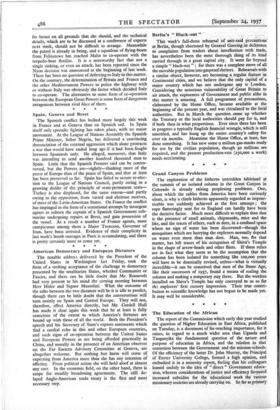American Democracy and European Dictators The notable address delivered by
the President of the United States in Washington last Friday, took the form of a striking acceptance of the challenge to democracy presented by the totalitarian States, whether Communist or Fascist, and there can be little doubt that Mr. Roosevelt had very present to his mind the coming meeting between Herr Hitler and Signor Mussolini. What the outcome of the talks between the two dictators will be it is idle to predict, though there can be little doubt that the conversations will turn mainly on Spain and Central Europe. They will not, therefore, affect America directly, but Mr. Cordell Hull has made it clear again this week that he at least is fully conscious of the extent to which America's fortunes are bound up with those of all the world. Both the President's speech and his Secretary of State's express sentiments which find a cordial echo in this and other European countries, and such signs of co-operation between the United States and European Powers as are being afforded practically in China, and morally in the presence of an American observer on the Far Eastern Advisory Committee at Geneva, are altogether welcome. But nothing but harm will come of expecting from America more than she has any intention of offering. From political action she will hold aloof at almost any cost. In the economic field, on the other hand, there is scope for steadily broadening agreements. The still de- layed Anglo-American trade treaty is the first and most necessary step.


















































 Previous page
Previous page